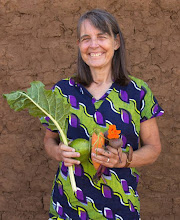Saturday, March 29, 2008
Saturday, March 29, 2008
"All fired up and ready to go". . .
This is one of Barack Obama's mantras and it can be mine too!
It's been a big week of pre-departure activity. I head off tonight for London and will be arriving in Freetown, Sierra Leone Monday night the 31st. The people at West Africa Fistula Foundation, WAFF (http://www.westafricafistulafoundation.org/), seem like very lovely people and I am already looking forward to new friendships.
Writer Nicholas Kristof's articles describe the plight of African women afflicted with obstetric fistulas so well, even though it describes events that took place in Ethiopia, the situation is the same all over Africa. Below is one of his New York Times pieces. Take the little time to read it and be inspired.
Thank you to everyone's love and support. I carry you all with me. Keep following the blog when you can. Robert's web expertise and map making certainly help make it happen.
Love,
Helen
The Illiterate Surgeon
Published in The New York Times: June 12, 2005
By NICHOLAS D. KRISTOF
nicholas@nytimes.com
Addis Ababa, Ethiopia
Just about the worst thing that can happen to a teenage girl in this world is to develop an obstetric fistula that leaves her trickling bodily wastes, stinking and shunned by everyone around her. That happened four decades ago to Mamitu Gashe.
But the most amazing thing about Ms. Mamitu is not what she endured but what she has become.
Ms. Mamitu's story begins when she was an illiterate 15-year-old in a remote Ethiopian village unreachable by road and with no doctor nearby. She married a local man, became pregnant and after three days of labor, she lapsed into unconsciousness and the baby was stillborn.
"After I woke up, the bed was wet" with urine, she remembers. "I thought I would get better after two or three days, but I didn't."
That's typically how an obstetric fistula arises: a teenage girl, often malnourished and with an immature pelvis, tries to deliver her first baby. The fetus gets stuck, and after several days of labor it is stillborn - but some of the mother's internal tissues have been damaged in that time, and so to her horror she finds herself constantly trickling urine or sometimes feces from her vagina.
Soon she stinks. Her husband normally abandons her, the constant trickle of urine leaves her with terrible sores on her legs, and if she survives at all she is told to build a hut away from the rest of the village and to stay away from the village well. Some girls die of infections or suicide, but many linger for decades as pariahs and hermits - their lives effectively over at the age of about 15.
Fistulas were common in America in the 19th century. But improved medical care means that they are now almost unknown in the West, while the United Nations has estimated that at least two million girls and women live with fistulas in the developing world, mostly in Africa.
This should be an international scandal, because a $300 operation can normally repair the injury. A major effort to improve maternal health in the developing world should be a no-brainer, for it could prevent most fistulas and reduce deaths in childbirth by half within a decade, saving 300,000 lives a year.
But maternal health is woefully neglected, and those suffering fistulas are completely voiceless - young, female, poor, rural and ostracized. They are the 21st century's lepers.
Ms. Mamitu was exceptionally lucky in that she was brought to a hospital here in Addis Ababa that offered free surgery by a saintly husband and wife pair of gynecologists from Australia, Reginald and Catherine Hamlin. Reg is now dead, while Catherine is the Mother Teresa of our time and is long overdue for a Nobel Peace Prize.
After that operation, 42 years ago, Ms. Mamitu was given a job making beds in the hospital. Then she began helping out during surgeries, and after a couple of years of watching she was asked by Dr. Reg Hamlin to cut some stitches. Eventually, Ms. Mamitu was routinely performing the entire fistula repair herself.
Over the decades, Ms. Mamitu has gradually become one of the world's most experienced fistula surgeons. Gynecologists from around the world go to the Addis Ababa Fistula Hospital to train in fistula repair, and typically their teacher is Ms. Mamitu.
Not bad for an illiterate Ethiopian peasant who as a child never went to a day of school.
A few years ago, Ms. Mamitu tired of being an illiterate master surgeon, and so she began night school. She's now in the third grade.
The Fistula Hospital where Ms. Mamitu works is nicknamed "puddle city" - because patients stroll around dripping urine - but it abounds with joy and hope.
President Bush has increased aid to the developing world generally and to Africa in particular, but a few days ago he rejected Tony Blair's appeal for a further dramatic increase in assistance for Africa. The real stakes in that rejection will be measured in lives like Ms. Mamitu's. I hope that Mr. Bush will reconsider - for the sake of people like those girls with fistula living in huts alone on the edges of hundreds of thousands of villages.
Ms. Mamitu shows us what a tragedy it would be to write them off. A couple of Australians once gave Ms. Mamitu a break, and so today Ms. Mamitu is not a victim at all, but an inspiration.
And, I hope, an inspiration to us to be more generous.
Subscribe to:
Post Comments (Atom)



No comments:
Post a Comment